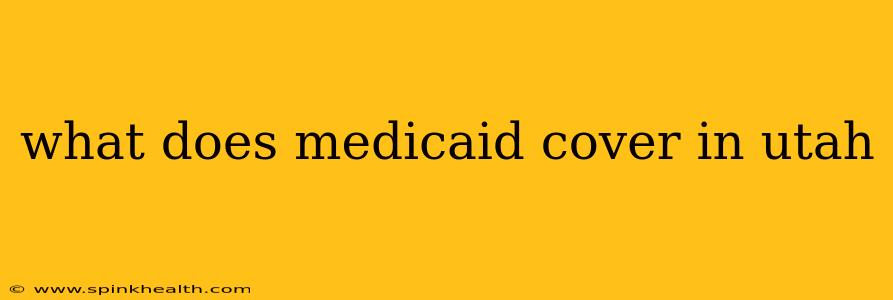What Does Medicaid Cover in Utah? Navigating the Landscape of Healthcare Assistance
Utah's Medicaid program, officially known as the Utah Department of Health and Human Services (DHHS), provides crucial healthcare coverage for eligible residents. But what exactly does it cover? It's a complex question with answers that depend on individual circumstances, but let's unravel the mysteries together. Think of this as your personal guide through the Utah Medicaid maze.
Imagine Sarah, a single mother working a minimum wage job. She's struggling to make ends meet, and the thought of affording healthcare for herself and her child is overwhelming. She's heard about Medicaid, but isn't sure what it entails. This story is common, and understanding Utah Medicaid's coverage is the first step to accessing vital healthcare.
What are the Basic Services Covered by Utah Medicaid?
Utah Medicaid, like its counterparts in other states, covers a wide range of essential health services. These include:
- Doctor visits: Routine checkups, specialist consultations, and emergency room visits are typically covered.
- Hospital care: This encompasses inpatient and outpatient hospital services, including surgery and related care.
- Prescription drugs: A significant portion of prescription medications are covered, though there may be formularies (lists of approved drugs) and prior authorization requirements.
- Mental health services: Access to mental health professionals, therapy, and medication management is a vital part of Utah Medicaid coverage.
- Substance use disorder treatment: Addressing addiction is a crucial component of overall health, and Utah Medicaid provides coverage for relevant treatments.
- Prenatal and postpartum care: Medicaid plays a vital role in supporting the health of mothers and their newborns before, during, and after pregnancy.
- Dental services: While the specifics vary, Medicaid helps cover essential dental care for children and sometimes adults.
- Vision care: Eye exams and glasses or contact lenses might be covered, particularly for children.
What Services Might NOT Be Covered by Utah Medicaid?
While Utah Medicaid offers extensive coverage, certain services might have limitations or require prior authorization:
- Certain prescription drugs: Brand-name medications might not always be covered, and generics are often preferred. Prior authorization may be needed for certain medications.
- Long-term care: Nursing home care and long-term residential care are not typically covered comprehensively by Medicaid; eligibility requirements are stringent.
- Cosmetic procedures: Procedures solely for cosmetic purposes are generally not covered.
- Some alternative therapies: While some complementary therapies might be covered if deemed medically necessary, others are excluded.
How Do I Find Out If I Qualify for Utah Medicaid?
Eligibility for Utah Medicaid hinges on several factors, including income, household size, and citizenship status. The eligibility requirements are clearly outlined on the DHHS website. They frequently update these guidelines, so it's crucial to check the current information. This is often the first question many people have.
What Documents Do I Need to Apply for Utah Medicaid?
To apply for Utah Medicaid, you'll generally need to provide documentation proving your identity, income, residence, and household composition. Specific requirements are detailed on the DHHS website or through their customer service line. This is another frequently asked question.
What if My Income Changes After I’ve Been Approved for Medicaid?
Your circumstances can change, and it's imperative to notify the DHHS immediately if there's a significant alteration in your income or household size. Failure to do so could jeopardize your coverage.
How Can I Learn More About Specific Medicaid Coverage in Utah?
The best resource is the official website for the Utah Department of Health and Human Services. You can also contact their customer service line for personalized assistance.
This journey through the intricacies of Utah Medicaid is just the beginning. Remember, this is a complex system, and understanding your specific rights and entitlements is crucial. Don't hesitate to seek professional assistance if needed. Navigating the system successfully can significantly improve your health and well-being.

